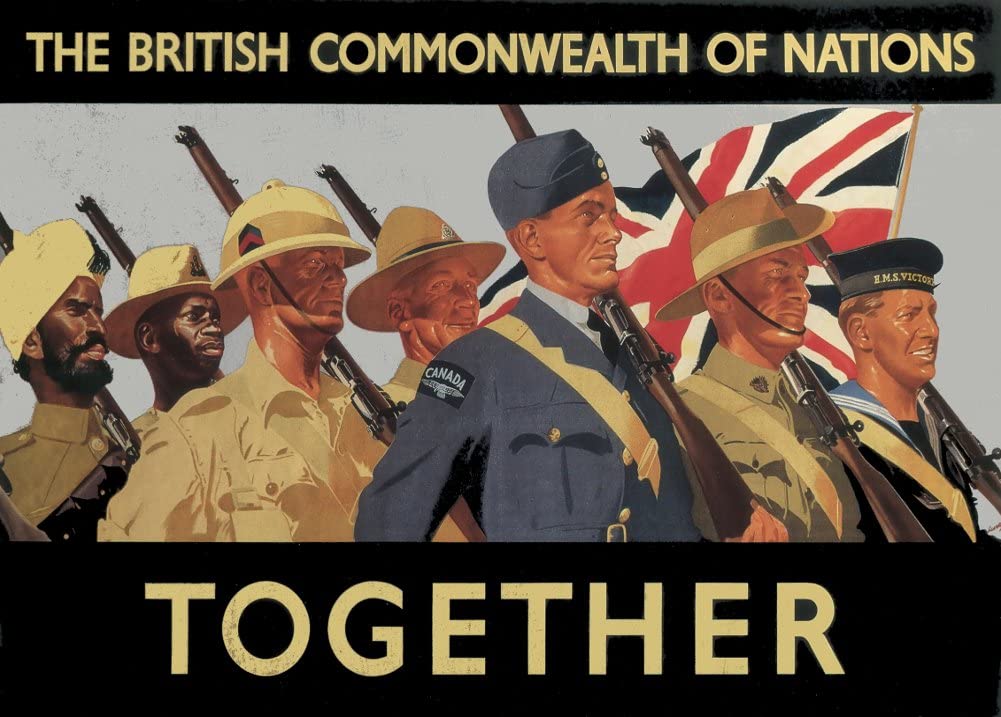While it is not often highlighted, men and women from the Commonwealth of Nations made a significant contribution to the war effort during World War Two – in terms of people, materials and food, interest-free loans and money raised to support the allies.
In 1939 the Commonwealth fell into two parts – countries such as Australia, Canada, New Zealand and South Africa whose leadership could make decisions separate from London – and the regions still wholly or partly governed from London, including India, the West Indies and remaining British colonies in Africa and the Far East. With the outbreak of war, the latter regions were given no choice but to join the war with Britain and the Allied nations.
In 1923 Air Ministry regulations excluded recruits who were not of ‘pure European descent’ from joining the British Armed Forces, the Royal Navy and the Royal Air Force, with strict exceptions. These restrictions were relaxed during the time of World War Two, and many men and women of Indian, Carribean and African descent served alongside white British troops across the world.
The Caribbean
Several thousand men and women were recruited from the Caribbean. Nearly 6000 people served in the RAF in both ground and flight crew roles. Some trained with the Royal Canadian Airforce before moving to Britain. 103 were decorated.
Thousands more served in the Merchant Navy, ensuring vital supplies reached Britain from across the world. In 1940, 1,800 of these men responded to an appeal to serve as crew for the cargo ships of the Merchant Navy, sure in the knowledge that this was dangerous work. Ships were regularly attacked by enemy ships forces and mines.
On the home front, 700 lumberjacks from Belize were recruited to work in the forests of Scotland. 350 Caribbean men and women worked in munitions factories, while others worked as skilled tradesmen in essential industries.
In addition, over 40,000 men and women volunteered to work as agricultural labourers in America.
East and West Africa
More than 600,000 African men fought for Britain during World War Two, drawn largely from East and West Africa. Over 320,000 came from East Africa, from Kenya, Tanganyika, and Uganda. Around 80,000 served as part of the South East Asia Command fighting Japanese forces.
While the majority of the men were volunteers, many were forcibly conscripted. First hand accounts describe severe and unnecessary corporal punishment of black African soldiers serving in Africa. Rates of pay were much lower, and Britain banned it’s African soldiers from reaching higher ranks. Rules also prevented senior African soldiers from disciplining lower-ranking white soldiers, with higher-ranking black soldiers instructed to address the lower ranking soldiers as ‘sir.’
India
Records show over 2.5 million Indian citizens volunteered during the Second World War. Indian servicemen served on all fronts. For example, the Fifth Indian Division fought alongside British servicemen in Sudan, Libya and Iraq, before joining eight additional Indian Divisions in Burma. India was also used as a military base for operations against the Japanese. Four Victoria Crosses were awarded to men in the Fifth Division, with another four awarded to servicemen from the Fourth Division. The Royal Indian Navy and the Indian Air Force also played a significant role in the conflict.
Over 36,000 Indian members of the armed forces were killed or reported missing in action, with more than 64,000 wounded.
Moving on from World War Two
Members of the Commonwealth contributed huge numbers of manpower, infrastructure and military to the Second World War. This came at a great cost. Estimated numbers suggest 150,000 military deaths, 400,000 wounded, 100,00 taken prisoners of war and at least 300,000 civilian deaths. Sadly, troops from the West Indies, Africa and India generally received less pay than their white counterparts at the same rank. After the war, many returned home to poverty.
In the final years of the 1940’s, a number of men and women from the Caribbean migrated to Britain. Most of the passengers on the infamous SS Empire Windrush were ex-servicemen seeking work.
Finally, in June 2017, a war memorial to the African and Caribbean soldiers of World War one and World War Two was unveiled in London. The sculpture can be visited in Windrush Square, Brixton.
